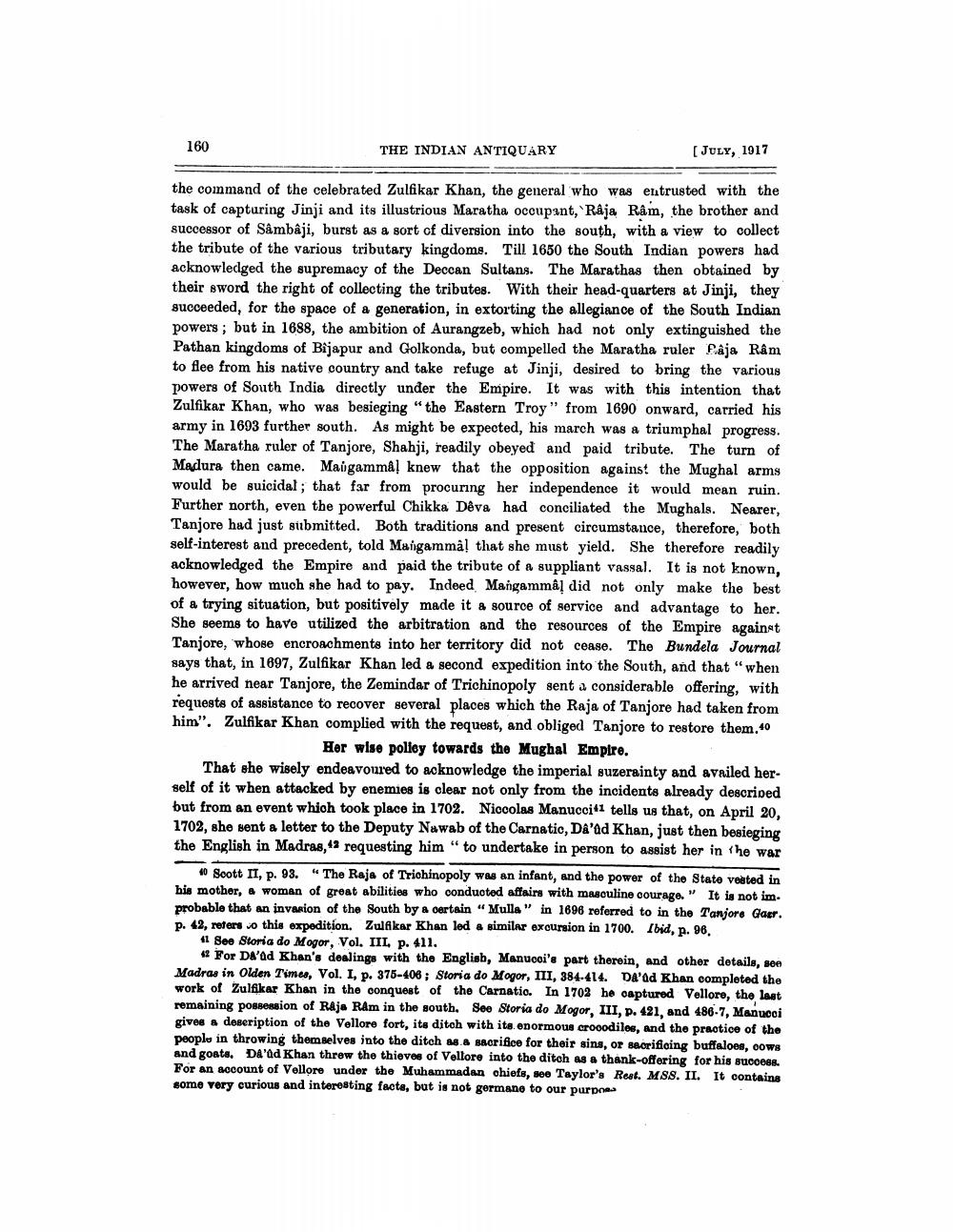________________
160
THE INDIAN ANTIQUARY
(JULY, 1917
the command of the celebrated Zulfikar Khan, the general who was entrusted with the task of capturing Jinji and its illustrious Maratha occupant, Raja Râm, the brother and successor of Sâmbâji, burst as a sort of diversion into the south, with a view to collect the tribute of the various tributary kingdoms. Till 1650 the South Indian powers had acknowledged the supremacy of the Deccan Sultans. The Marathas then obtained by their sword the right of collecting the tributes. With their head-quarters at Jinji, they succeeded, for the space of a generation, in extorting the allegiance of the South Indian powers; but in 1688, the ambition of Aurangzeb, which had not only extinguished the Pathan kingdoms of Bijapur and Golkonda, but compelled the Maratha ruler Pâja Râm to flee from his native country and take refuge at Jinji, desired to bring the various powers of South India directly under the Empire. It was with this intention that Zulfikar Khan, who was besieging "the Eastern Troy" from 1690 onward, carried his army in 1693 further south. As might be expected, his march was a triumphal progress. The Maratha ruler of Tanjore, Shahji, readily obeyed and paid tribute. The turn of Madura then came. Maigammal knew that the opposition against the Mughal arms would be suicidal; that far from procuring her independence it would mean ruin. Further north, even the powerful Chikka Dêva had conciliated the Mughals. Nearer, Tanjore had just submitted. Both traditions and present circumstance, therefore, both self-interest and precedent, told Mangamma! that she must yield. She therefore readily acknowledged the Empire and paid the tribute of a suppliant vassal. It is not known, however, how much she had to pay. Indeed Mangammâl did not only make the best of a trying situation, but positively made it a source of service and advantage to her. She seems to have utilized the arbitration and the resources of the Empire against Tanjore, whose encroachments into her territory did not cease. The Bundela Journal says that, in 1897, Zulfikar Khan led a second expedition into the South, and that "when he arrived near Tanjore, the Zemindar of Trichinopoly sent a considerable offering, with requests of assistance to recover several places which the Raja of Tanjore had taken from him". Zulfikar Khan complied with the request, and obliged Tanjore to restore them.40
Her wise polley towards the Mughal Empire. That she wisely endeavoured to acknowledge the imperial guzerainty and availed herself of it when attacked by enemies is clear not only from the incidents already descriped but from an event which took place in 1702. Niccolas Manucci'l tells us that, on April 20, 1702, she sent a letter to the Deputy Nawab of the Carnatio, Da'ad Khan, just then besieging the English in Madras, requesting him "to undertake in person to assist her in the war
40 Scott II. p. 03. "The Raja of Triohinopoly was an infant, and the power of the Stato vested in his mother, a woman of great abilities who conducted affairs with masculine courage. It is not im. probable that an invasion of the South by a certain "Mulla" in 1696 referred to in the Tanjore Gaer. p. 42, refers vo this expedition. Zulfikar Khan led a similar excursion in 1700. Ibid, p. 96,
41 See Storia do Mogor, Vol. IIL p. 411.
# For Da'ad Khan's dealings with the English, Menucoi'e part therein, and other details, see Madras in Olden 7\mes, Vol. I, p. 375-406 - Storia do Mogor, III, 384.414. DA'Ad Khan completed the work of Zulfikar Khan in the conquest of the Carnatio. In 1702 he captured Vellore, the last remaining possession of Raja Ram in the south, See Storia do Mogor, III, p. 421. and 486-7, Manucci gives a doseription of the Vellore fort, ita ditoh with its enormous crocodiles, and the practice of the people in throwing themselves into the ditch as a sacrifice for their sins, or sacrificing buffaloes, cows and goats. Da'ad Khan throw the thieves of Vellore into the ditch as a thank-offering for his suc008. For an account of Vellore under the Muhammadan chiefs, so Taylor's Rest. MSS. IL. It contains some very curious and interesting facts, but is not germane to our purpos




